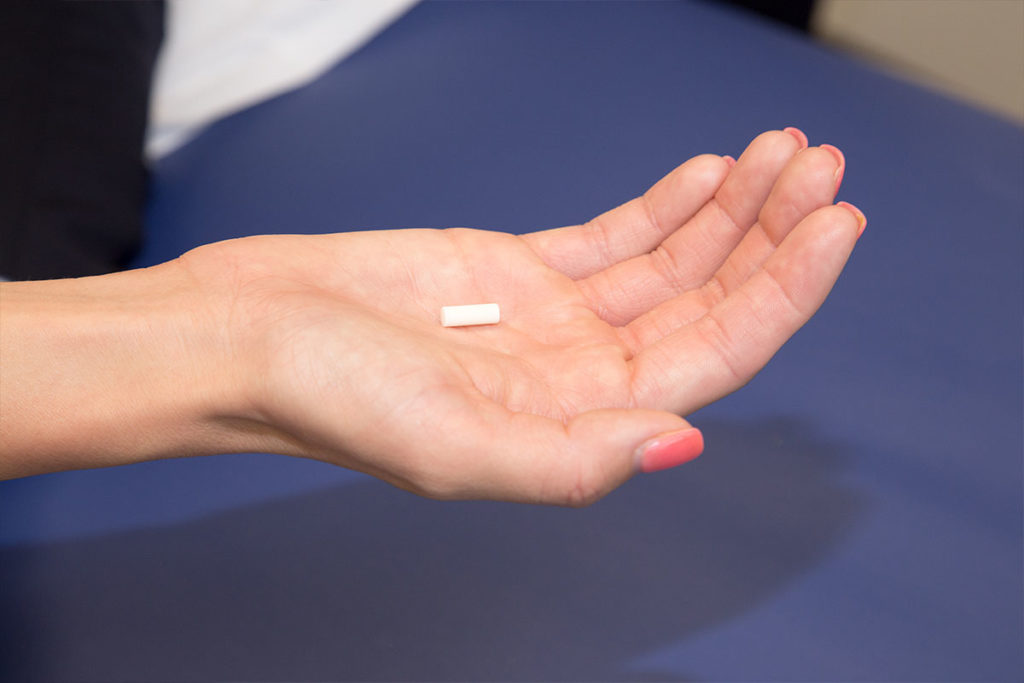 Low Dose Naltrexone (LDN) may help to relieve pain for Fibromyalgia patients. It can also be used for patients with autoimmune disorders to help restore the immune system.
Low Dose Naltrexone (LDN) may help to relieve pain for Fibromyalgia patients. It can also be used for patients with autoimmune disorders to help restore the immune system.
Naltrexone was first synthesized in 1963 as an opioid receptor antagonist which means that it counteracts the effects of opioids. It went on to be approved by the FDA in 1984 and is used for the treatment of opioid addiction with the typical dose of 50 to 100 mg. LDN refers to daily dosages of Naltrexone that range from 1.5 mg to 4.5 mg. Basic research examining the use of opioid antagonists for treating diseases and chronic pain did not start to appear until the 1980s, and the first published LDN trial in humans was only presented in 2007. Since then, LDN has been studied in a small number of labs and is slowly gaining attention for possible treatment for other chronic health conditions.
A New York physician, Dr. Bernard Bihari is the person who discovered that there were additional benefits of Naltrexone at lower doses. In the 1980s, he noticed that a lot of his patients with opioid addictions also had HIV/AIDS. He discovered that people with HIV had 20% fewer endorphins and began to look for new ways to approach the disease. He began working with other physicians across the United States and they did studies on the connection between endorphins and the effect they have on the immune system.
When Dr. Bihari’s patients were taking Naltrexone for addiction, they felt “lousy” according to him. This is because not only did Naltrexone block the effects of opioids, it also blocked the brain’s ability to produce endorphins which further compromised the immune system of the HIV patients. Through their studies and collaboration, they realized that giving much lower doses of Naltrexone to patients, actually enhanced endorphin production by the brain, and thus strengthened the patients’ immune systems without the side effects of feeling so bad.
How Does Low Dose Naltrexone Work?

Dr. Bihari and his colleagues noted that while LDN can’t cure diseases such as cancer or viruses, it can strengthen the immune system so that it’s able to prevent these types of diseases from progressing. You can read more about Dr. Bihari’s journey and research with Low Dose Naltrexone in his interview with the Global Medicine Review.
Autoimmune patients and cancer patients have lower levels of endorphins than people who don’t have these diseases and LDN has been found to beneficial for some of these patients. LDN has a 50/50 mixture of 2 different isomers (molecules). One binds to immune cells and the other binds to opioid receptors which cause increased endorphin release. These modulate the immune response and also cause increased release of the endorphins. Additionally, for the patient with autoimmune disease, it helps the body to stop attacking itself.
The main goal of using LDN is to halt and slow the progression of the disease and/or symptoms. For some patients, its benefits can be felt within a few weeks, but for others, it may take a few months. Patients using it report having a better function and higher tolerance to pain. This can be especially beneficial to the Fibromyalgia or CFS patient. Additionally, because endorphin production is increased by taking LDN, it can lead to a better sense of well-being.
Low Dose Naltrexone is not an opioid or narcotic and is not addictive. It does not exert any euphoric effects, and we know of no cases of LDB misuse or abuse or the development of dependence on this medication. Studies have shown that the cessation of LDN is generally followed by a low return of symptoms to baseline levels, showing that it’s not a cure, but used for relief of symptoms. With that said, LDN isn’t just for the relief of symptoms.
Patients do report symptom relief when using LDN. However, it’s important to note that LDN does modulate the immune system which can halt or slow the progression of some diseases. For example, a patient with Hashimoto’s Disease, which is an autoimmune disorder in which the immune system goes awry and starts to attack the thyroid gland, can see a marked decrease in antibodies. In other words, the immune system begins to calm down. Patients who are on medication for hypothyroidism caused by Hashimoto’s have noted that they are able to drastically decrease their medication, and in some cases, discontinue it.
Conditions Treated With LDN
Low Dose Naltrexone has also been shown to have both anti-inflammatory and analgesic properties. These effects are most notable in patients with autoimmune conditions or other types of illness in which the immune system has been compromised such as Fibromyalgia, and Crohn’s Disease.
In patients with autoimmune disorders, glial cells are activated which causes the nerves to fire, producing pain and inflammation. Low Dose Naltrexone has been shown to inhibit the nerves from firing which translates into lower inflammation levels and reduced pain. According to lowdosenaltrexone.org, patients and physicians have seen success with LDN in almost every autoimmune type disease such as:
- Hashimoto’s Disease
- Rheumatoid Arthritis
- Ulcerative Colitis
- Multiple Sclerosis
- Celiac Disease
- Psoriasis
- Sjogren’s Syndrome
- Scleroderma
Use of Low Dose Naltrexone for Chronic Pain
LDN has been tested in a small number of chronic pain conditions with one specifically being Fibromyalgia. Fibro is a chronic pain disorder that is characterized by musculoskeletal pain, extreme fatigue, cognitive disruption, and difficulty sleeping, among other symptoms. Two separate clinical trials to date have shown that LDN may be an effective treatment for Fibromyalgia. In both trials, LDN was administered at 4.5 mg daily, one time per day to be taken at night right before bedtime. LDN has also been used for patients with Myalgic Encephalomyelitis (ME), also known as Chronic Fatigue Syndrome.
“In the first crossover trial, published in 2009, LDN reduced fibromyalgia pain significantly greater than placebo in 6 out of the 10 women. While the pilot study was encouraging, it had limitations such as a single-blind design.
To help validate the findings, a second study in 30 women with fibromyalgia was conducted. In that double-blind, crossover, counterbalanced study, 57% of the patients were observed to exhibit a significant (1/3) reduction of pain during LDB. At the end of the LDB treatment, half of the participants reported feeling ‘much improved’ or ‘very much improved’ from LDN. Together, these two studies suggest that LDN is superior to placebo in reducing the pain associated with fibromyalgia.”
Dr. Bihari noted that “within a specific dosage window, LDN can exert a ‘paradoxical’ analgesic effect” which aren’t exhibited with higher doses of Naltrexone. It’s also been shown to have neuroprotective effects.
Side Effects of Low Dose Naltrexone
Because LDN is an opioid antagonist, you should not take this drug if you are currently using opioid pain medications or Tramadol because it will render them ineffective. Common side effects have been mild and may include:
- Very vivid dreams
- Insomnia
- Flu-like symptoms
- Diarrhea/constipation
It’s important to note that usually if a person is experiencing side effects, all that’s required is to lower the dosage for a few weeks so that they can adjust to it. Once the patient is able to adjust, the dosage can be increased incrementally without side effects so the patient is able to get all of the benefits. As a daily regimen, LDB is inexpensive and tolerated well.
A study published by Clinical Rheumatology reports:
“One of the most exciting aspects of LDN is the low reported incidence of adverse side effects. We have not seen incidences of ulcers, rental insufficiency, interference with warfarin and other common medications, increased heart attack or clotting risk, or other problems that can be seen with nonsteroidal anti-inflammatory drugs. We have observed no cases of severe adverse events in our research, and none have been reported from other laboratories. We have observed no withdrawal symptoms when LDN treatment is stopped, and withdrawal is not a known effect of treatment discontinuance. However, the complete sample size of all LDB trials combined is still quite small and thus, clinical useful data and experience are limited.”
Free Phone Consultation with our New Patient Coordinator
Renewed Vitality is a place of hope. Our knowledgeable providers are experts in their field and take the time to find the underlying causes of hormonal imbalances and illness. We will work with you using proven, scientific-based technology, in a warm and compassionate environment, to help you restore your health so that you can live a life of vitality and wellness.
Please contact our New Patient Coordinator for your Free Phone Consultation. She can answer any questions or concerns that you may have and give you additional information about our providers, our protocols and fees, what is covered by insurance and what is not, and any other details you may need. She can also get you booked for your first appointments if you decide we are a good fit for you. There are no obligations to book an appointment. Please call 214-740-4703 to learn more, or complete the form below, and we will contact you. We would love to hear from you!